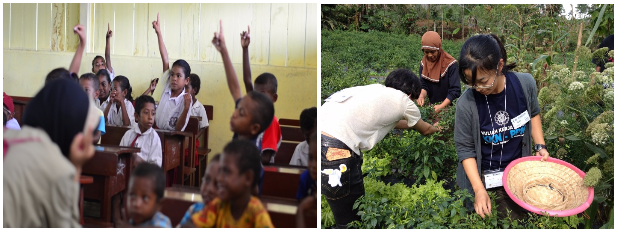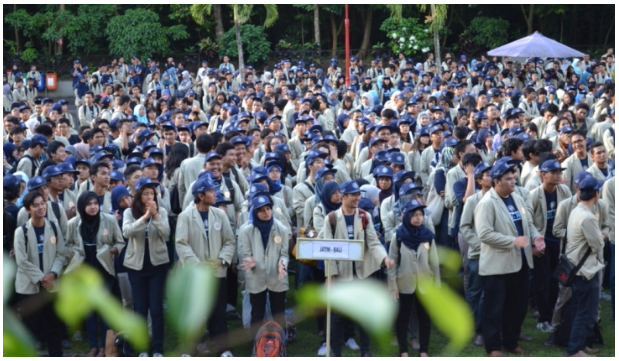Uncategorized
Community empowerment is a mandatory program for every UGM student. This program is very dynamic and gives new experiences to each participant by living in a society different from the original place. In addition, there are differences of customs, culture, and life values that are new for the participants.
Community empowerment program is conducted throughout Indonesia from Sabang to Merauke. This makes the community empowerment program highly effective to introduce Indonesia's richness in terms of ethnic, cultural, linguistic, landscapes, and biodiversity.
This community empowerment program opens new opportunities for international students to participate. This provides a chance for international students to experience life in Indonesian small and marginalized communities especially in the village.
This program is better known as SCS-CEL (Student Community Service – Community Empowerment Learning) it is an intra-curriculum activity that collaborates on three elements based on the three basic principles of a university (TRI DHARMA). The three elements are, (1) personality empowerment, 2) institutional development and, 3) community empowerment. The program's activities are carried out systematically and tailored to the priorities of the community and partners who assist in the success of the activities.
In the implementation, SCS-CEL opens wide cooperation capacity for various stakeholders to be able to contribute in this program. Whether it is from the government or private agencies, communities, and other stakeholders. Only through various collaborations, the SCS-CEL program will succeed its core mission; to empower and develop small-marginalized communities.
Through SCS-CEL, it is expected that student’s awareness towards everyday livelihood issues will increase. In the other hand, international students are expected to share their experiences and knowledge to the local community.
Two years after the university’s establishment in 1949, Universitas Gadjah Mada (UGM) has started to deploy its students to do Community Service Program. In a decade period, no less than 1218 students have been commissioned, resulting in 109 newly established high schools in areas outside of Java. This was the initial form of what came to be known today as Student Community Services (SCS). Following UGM’s law expert, Prof. Koesnadi Hardjasoemantri’s,
recommendation in 1971 the program was then made compulsory for UGM undergraduate students.
As came to be known as the “Populist University”, “University of Pancasila”, and “University of Struggles”, UGM has the moral obligations to maintain the quality of SCS program. Hence, in 1999, a thematic SCS program emerged to propose alternative solutions towards Indonesian monetary crisis in the preceding year. Entering the second millennium, UGM shifted SCS’s development paradigm into research-empowerment paradigm to contextualize the program as a respond to the continuous globalization pressures on a society that was economically weak.
Thus, in 2006, the program name was changed into Student Community Services – Community Empowerment Learning (SCS-CEL).


Since then, SCS-CEL has been a dynamic and responsive national initiative program encouraging sustainable independence and welfare for the Indonesia grass roots levels in nearly all 34 provinces. The program is now made for Indonesian students and foreigners, with a total of 32 universities from 15 countries already having participation, namely: Norway, South Korea, Japan, Australia, Austria, France, Germany, etc. Both Indonesian and international students collaborate in putting together effective and applicable programs which derived from several focuses of interest, such as: improving education in remote areas, community-based health policy, women empowerment, disaster early warning system and mitigation, cultural and local wisdom-based natural resources conservation, cultural-based conflict resolution, rural governance and administration, enhancement of law and political awareness, small and medium enterprises development, and sustainable agricultural production. In 2016 alone, SCS- CEL program was implemented in 33 provinces, 108 districts, 179 sub districts, and 276 villages. In total since its beginning, the SCS-CEL program has dispatched more than 200.000 students to all provinces in Indonesia.
- Definition list
- Consectetur adipisicing elit, sed do eiusmod tempor incididunt ut labore et dolore magna
aliqua. Ut enim ad minim veniam, quis nostrud exercitation ullamco laboris nisi ut aliquip ex ea
commodo consequat. - Lorem ipsum dolor sit amet
- Consectetur adipisicing elit, sed do eiusmod tempor incididunt ut labore et dolore magna
aliqua. Ut enim ad minim veniam, quis nostrud exercitation ullamco laboris nisi ut aliquip ex ea
commodo consequat.
HTML Ipsum Presents
Pellentesque habitant morbi tristique senectus et netus et malesuada fames ac turpis egestas. Vestibulum tortor quam, feugiat vitae, ultricies eget, tempor sit amet, ante. Donec eu libero sit amet quam egestas semper. Aenean ultricies mi vitae est. Mauris placerat eleifend leo. Quisque sit amet est et sapien ullamcorper pharetra. Vestibulum erat wisi, condimentum sed, commodo vitae, ornare sit amet, wisi. Aenean fermentum, elit eget tincidunt condimentum, eros ipsum rutrum orci, sagittis tempus lacus enim ac dui. Donec non enim in turpis pulvinar facilisis. Ut felis.
Header Level 2
- Lorem ipsum dolor sit amet, consectetuer adipiscing elit.
- Aliquam tincidunt mauris eu risus.
Lorem ipsum dolor sit amet, consectetur adipiscing elit. Vivamus magna. Cras in mi at felis aliquet congue. Ut a est eget ligula molestie gravida. Curabitur massa. Donec eleifend, libero at sagittis mollis, tellus est malesuada tellus, at luctus turpis elit sit amet quam. Vivamus pretium ornare est.
Header Level 3
- Lorem ipsum dolor sit amet, consectetuer adipiscing elit.
- Aliquam tincidunt mauris eu risus.
#header h1 a {
display: block;
width: 300px;
height: 80px;
}
Welcome to WordPress. This is your first post. Edit or delete it, then start writing!
